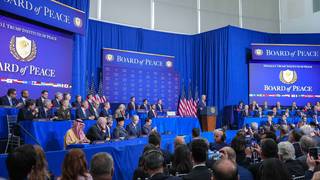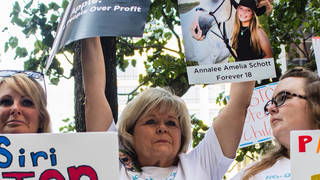
Guests
- Pablo Calviassociate professor at Stony Brook University’s School of Communication and Journalism and the associate director for Latin America for the Marie Colvin Center for International Reporting. Calvi previously worked for the Argentine newspaper Clarín.
We speak to Argentine journalist Pablo Calvi about the U.S. government’s multibillion-dollar bailout for Argentina, which could grow from $20 billion to $40 billion as Argentina is rocked by an ongoing economic crisis. “I don’t see that the bailout would benefit the Argentine people or the American people, for that matter,” says Calvi. Instead, he believes the tech industry will reap the financial rewards from its ties to U.S. President Trump and his ally, far-right Argentine President Javier Milei, who attended the conservative CPAC conference in the U.S., where he gifted billionaire Elon Musk a chain saw.
Transcript
AMY GOODMAN: This is Democracy Now!, democracynow.org, The War and Peace Report. I’m Amy Goodman, with Nermeen Shaikh.
NERMEEN SHAIKH: As the U.S. government shutdown enters its 16th day, the Trump administration is threatening to lay off 10,000 government workers and cut more funds to Democratic-led areas. Meanwhile, President Trump has offered a $20 billion bailout for Argentina, and the total size of the bailout could reach $40 billion.
On Tuesday, Trump hosted Argentina’s far-right President Javier Milei at the White House. Trump said the U.S. would only help Argentina if Milei’s party won legislative elections later this month.
PRESIDENT DONALD TRUMP: We’re going to work very much with the president. We think he’s going to win. He should win. And if he does win, we’re going to be very helpful. And if he doesn’t win, we’re not going to waste our time, because you have somebody whose philosophy has no chance of making Argentina great again.
NERMEEN SHAIKH: Trump said the bailout was, quote, “just helping a great philosophy take over a great country.” Milei is a close ally of the Trump administration. Earlier this year, Milei attended the conservative CPAC conference in the U.S., where he gifted billionaire Elon Musk a chain saw.
AMY GOODMAN: Critics of the U.S. bailing out Argentina point out Treasury Secretary Scott Bessent’s friends who lead financial firms, including BlackRock, Fidelity and PIMCO, are heavily invested in Argentina and would benefit financially.
We’re joined now by Pablo Calvi. He is a writer and journalist from Argentina, associate professor at Stony Brook University’s School of Communication and Journalism and the associate director for Latin America for the Marie Colvin Center for International Reporting at Stony Brook. Calvi previously worked for the Argentine newspaper Clarín. Last year, he wrote a piece for Jacobin titled “In Argentina, Javier Milei’s Shock Therapy Is Wreaking Havoc.”
So, you have thousands of workers being furloughed and fired here in the United States, but President Trump says he’s giving $20 billion in a bailout to the Argentine president, hosting him at the White House. The significance of this and what Milei is doing in Argentina?
PABLO CALVI: Well, thank you for having me, first.
It’s important for Milei to maintain stability of the Argentine peso, so he needs some type of reassurance. And the $20,000 [$20 billion] that the Treasury is holding — it’s not giving the money to Argentina, it’s keeping it — plus the potential $20,000 [$20 billion] from private funds, is geared towards weathering potential fluctuations in the peso and keeping inflation at bay. So, it helps a lot for the Milei government to reach the midterm elections in good shape.
Now, why is Trump doing this? There’s, at least to me, three potential explanations. One is the geopolitical one. If you think after 2001, the — after September 11, there’s no clear focus on Latin America. We entered that phase that experts called benign neglect. The United States focused preeminently on the Middle — in the Middle East. So, the “war on drugs” ended, and the “war on terror” started. So, with that, a constant flow of money that was going to Latin America, particularly Colombia, ended. Now you have a left-leaning president, Gustavo Petro, in the United Nations advocating for the creation of an international military organization to curb the genocide in Gaza. So you see that Colombia, who was a historically very strong ally of the United States, is not there anymore. And Trump, I think, sees the opportunity to create a geopolitical ally with Argentina.
And the second part, I think, is purely economic. I think it’s a little bit overlooked, but if you look at the proximity of the people who are with Trump, you see a lot of tech people, JD Vance basically mentored by Peter Thiel, Elon acting as the matchmaker between Trump and Milei. You have the CEO of Oracle, which now owns TikTok, and — the Ellisons, right? And his son —
AMY GOODMAN: Larry and David Ellison —
PABLO CALVI: Larry and David.
AMY GOODMAN: — owning CBS, Paramount.
PABLO CALVI: Yes, exactly. So, there’s a lot of connections with the tech industry. And what the tech — and, you know, it’s been overlooked a little bit, but a few days ago, Sam Altman announced that he was going to invest $25 billion in an AI center in Patagonia, right? So, there’s a number of things that have to do with AI, crypto, that require enormous amounts of energy, that require vast amounts of land, water, the precious earth minerals that you’re not going to get — the U.S. is not going to get from the Ukraine anytime soon. Argentina has them, lithium. So, all those things, and I think that the tech industry is supporting that second take on what could happen if Argentina was closer to the United States.
And I think the third point, the third leg of this equation, to me, is the ideological affinity that Trump and Milei have. Milei is a little bit of a Mini-Me of Trump, although he looks a little bit more like Austin Powers, but he’s like his mini —
AMY GOODMAN: He’s a mini-Trump?
PABLO CALVI: He’s a little bit of a mini-Trump. They are different in the sense that Trump is more nationalist-coded, and Milei is still a globalist. He wants investments to come to Argentina. But they are both populists. They are both bombastic in their own ways. So, I think that there’s very — there’s a lot of similarities. Milei is a — I think, is a fan boy of Trump. So, there’s some affinity there.
NERMEEN SHAIKH: Well, also, you know, it seems for a U.S. president to condition a bailout on the electoral prospects of the person who is in power is, I think, perhaps unprecedented. I mean, Trump did something similar in Brazil, but kind of against the administration in power. Because of the case, ongoing case, against Bolsonaro, he imposed tariffs and so on. But first, if you could comment on that? I mean, there are, I think, two instances. The Americans bailed out Mexico and also South Korea, but that was, of course, to stave off economic collapse. And there were conditions, but they weren’t those conditions. If you could respond to what many are saying, that, in fact, this plan could totally backfire, because people in Argentina don’t want the U.S. to meddle in their internal affairs? And a vast — I mean, over a majority of Argentinians, 60%, actually don’t support Trump.
PABLO CALVI: Yeah, I think that it could backfire in Argentina, as it’s backfiring here in the States, right? Trump is heavily criticized for using money that he could be using here, and allocating it to Argentina. I don’t see too many scenarios in which this bailout benefits anybody other than Milei, Trump and the sectors that surround them, right? I don’t see that the bailout would benefit the Argentine people or the American people, for that matter.
AMY GOODMAN: I mean, this is amazing, what is happening around the world. You have The New York Times exposé on Steve Witkoff and his son, the headline, “As Witkoff Pitched Mideast Peace, His Son Pitched Mideast Investors.” And that one begins, “As Steve Witkoff, President Trump’s envoy to the Middle East, conducted delicate cease-fire negotiations between Israel and Hamas … his son Alex was on another mission … quietly soliciting billions of dollars from some of the same governments whose representatives were involved in peace talks with his father.”
Then you have the Trump family. Since he came into office, I think Eric Lipton of the Times estimated, very conservatively, they made some well over $3 billion around the world, using Trump in the presidency.
And now you have from The New York Times, “Major hedge funds, including those led by friends of Treasury Secretary Scott Bessent, could benefit financially from the bailout. Funds at investment firms including BlackRock, Fidelity and Pimco … heavily invested in Argentina.”
The final comment on this, as you’re saying it’s not only Trump, it is Bessent, the Treasury secretary, who was right there yesterday — this week, when Milei was sitting in the White House?
PABLO CALVI: Yeah, and Bessent is trying to tone down the conditionality of the loan, because that would not benefit the transaction. If Trump rocks the boat a little bit, then the —
AMY GOODMAN: It could bring the investment to $40 billion, not — $20 billion from the government, and then from private investors, to $40 billion.
PABLO CALVI: Yeah, and it could — and if there’s inflation in Argentina, everything is all for naught, right? So, I think that Bessent is trying to calm the rumors of the conditionality of the loan a little bit. I think that, again, I don’t see many people benefiting from this.
AMY GOODMAN: Well, I want to thank you, Pablo Calvi, for joining us, journalist from Argentina, associate professor at Stony Brook University’s School of Communication and Journalism. We’ll link to your Jacobin article, “In Argentina, Javier Milei’s Shock Therapy Is Wreaking Havoc.” And folks can go to our website at democracynow.org to see our interview with professor Pablo Calvi at democracynow.org.
Coming up, the Supreme Court appears poised to further weaken the Voting Rights Act. Back in 20 seconds.
[break]
AMY GOODMAN: “Mazel,” Tunisian American Emel — that’s Emel Mathlouthi — performing in our Democracy Now! studio. To see all her performance and interview, go to democracynow.org. She’s touring through Europe next month.













Media Options